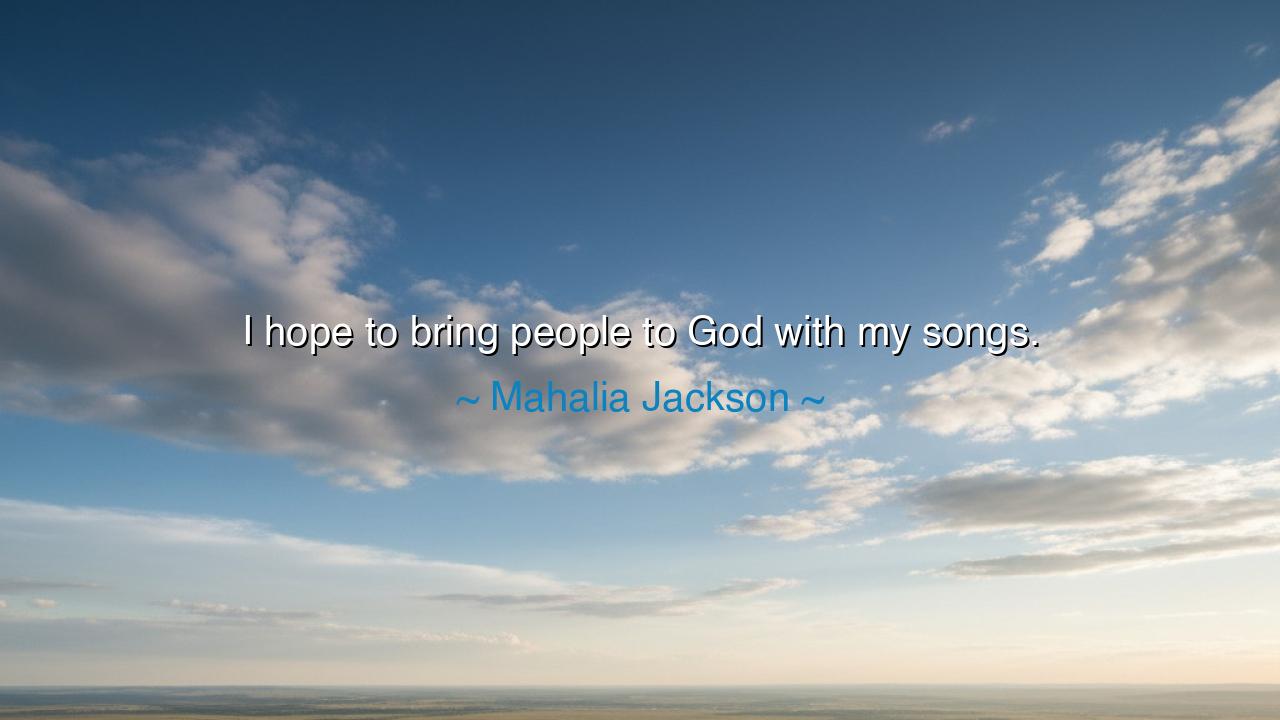
I hope to bring people to God with my songs.






“I hope to bring people to God with my songs.” Thus spoke Mahalia Jackson, the Queen of Gospel, whose voice rose like a prayer over a weary world. In this single, luminous sentence lies the heart of her life’s mission—a purpose not born of ambition or fame, but of faith. These words do not merely describe a singer’s desire; they reveal a calling, a vow to use the gift of music as a bridge between the human and the divine. For to bring people to God is not only to move their hearts, but to awaken their souls—to remind them, through sound and spirit, of the light that still burns within.
The origin of this quote rests in Mahalia Jackson’s deep connection to the gospel tradition, the music of her people and her faith. Born in the shadows of New Orleans in 1911, she rose from poverty and struggle, carrying within her the echoes of sorrow, hope, and redemption. Her songs were not mere melodies; they were testimonies, born from the suffering and endurance of generations who had sung their way through bondage and despair. When she sang, she did not perform for applause—she ministered to the broken-hearted. Each note was a prayer, and each performance, a sermon. When she said, “I hope to bring people to God,” she meant that every song should lift weary souls toward strength, forgiveness, and divine love.
To understand her meaning is to grasp the ancient power of music as worship. Long before words were written, the ancients raised their voices in chant and hymn to call upon the unseen. The psalms of David, the hymns of the early Christians, the sacred songs of tribes and temples—all were acts of communion between man and the divine. Mahalia stood in that timeless lineage. Her music was not bound by stage or denomination; it was the language of the soul, a cry that could pierce the heavens. Her voice, rich and unyielding, reminded the listener that faith is not silence—it is the courage to sing even when the night is long.
There is a story told of the day Mahalia Jackson sang before a vast crowd at the March on Washington in 1963, moments before Dr. Martin Luther King Jr. delivered his immortal “I Have a Dream” speech. As she sang “I’ve Been ‘Buked and I’ve Been Scorned,” her voice washed over the multitude like holy fire. Dr. King, moved to his core, would later say that her song had “prepared the people’s hearts for the message.” It was in that sacred union—song and sermon, melody and message—that her purpose was fulfilled. She did not just sing to God; she brought others to God through her song, awakening a spirit of faith and hope that transcended the walls of race, creed, and nation.
Her quote also carries a quiet but profound humility. “I hope,” she says—not “I will,” nor “I must.” In those two words lies the humility of the servant, one who understands that the power to transform does not belong to the singer, but to the Spirit moving through her. Mahalia knew that her voice was but an instrument of grace, and that the true transformation happened within the hearts of her listeners. Her hope was not for recognition or power, but for the awakening of others—that through her gift, someone lost might find peace, someone weary might find strength, and someone faithless might find the face of God again.
Her message reaches far beyond music. For each of us, in whatever labor we undertake, there lies the same sacred possibility: that our work, when done with love and purpose, may become a vessel for something greater. To “bring people to God” is not reserved for preachers or singers alone—it is the mission of every soul who lives with compassion, truth, and beauty. The teacher who inspires, the healer who comforts, the friend who forgives—all are bearers of light. The lesson of Mahalia’s words is this: your gift, however small, can be holy if you use it to uplift others.
So, my friends, let the spirit of Mahalia Jackson guide you. Whatever your art, your labor, your dream—let it be done with the same fire of faith and love that burned in her songs. Do not work merely for applause or reward; work to awaken the divine spark in others. Speak words that heal, create things that inspire, live a life that sings of goodness. For the highest purpose of talent is not self-glory, but service—to bring others closer to grace.
And remember this: the song that brings one soul back to hope, even quietly, even unseen, is the song that echoes in eternity. As Mahalia’s voice still stirs hearts long after her passing, so too can your acts of faith and kindness ripple through the ages. To live with such purpose is to become, like her, a living hymn—one whose every note, every word, and every breath whispers: “I hope to bring people to God.”






AAdministratorAdministrator
Welcome, honored guests. Please leave a comment, we will respond soon